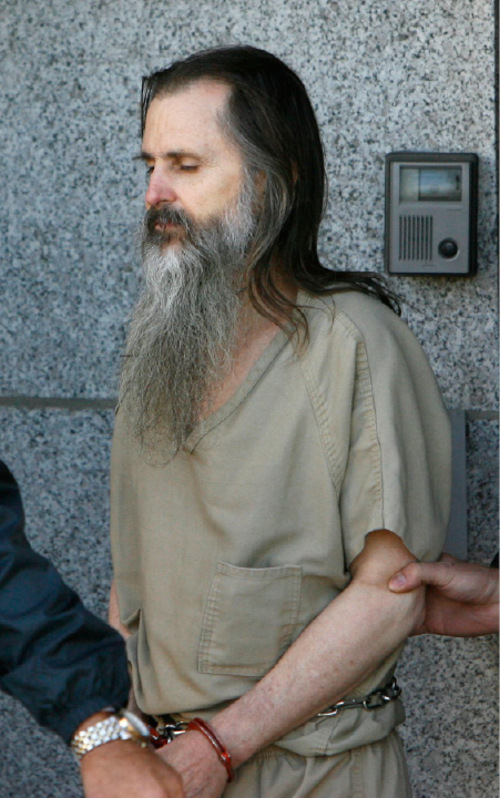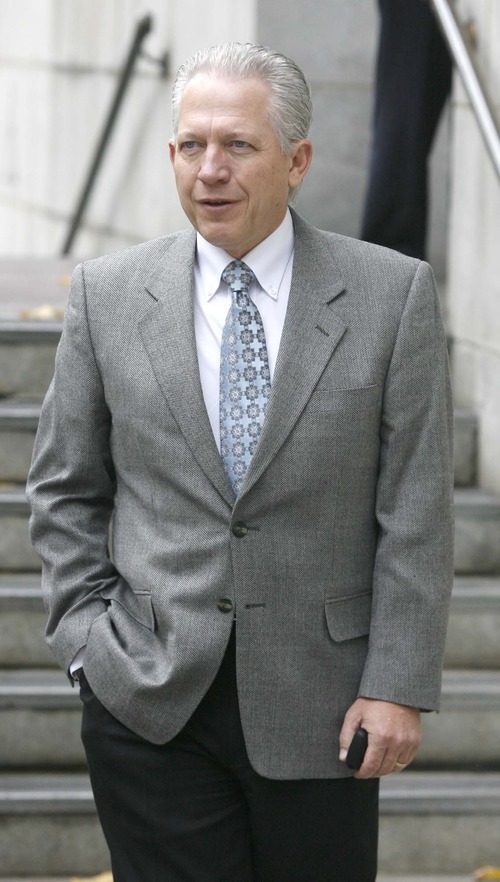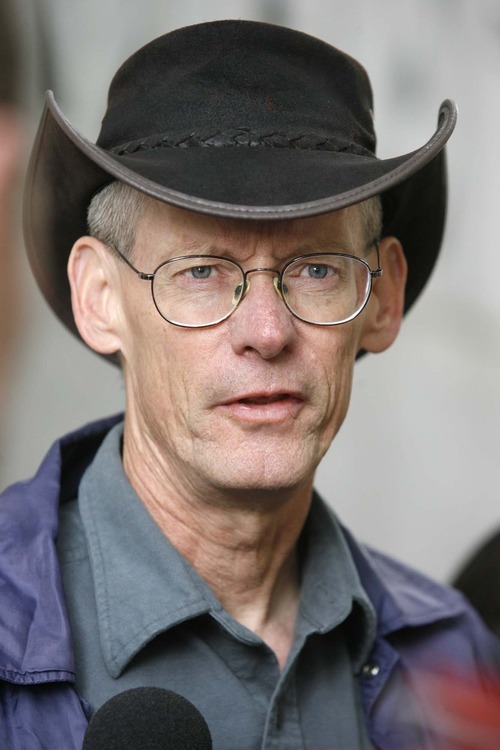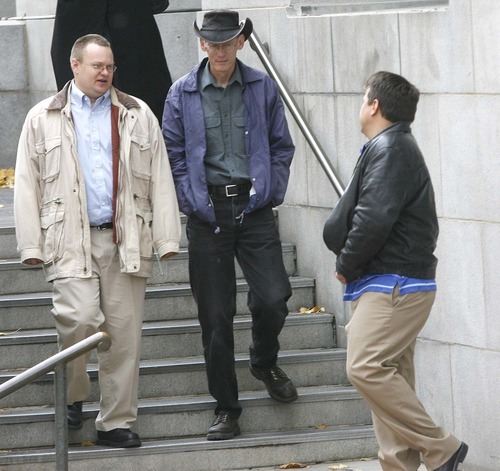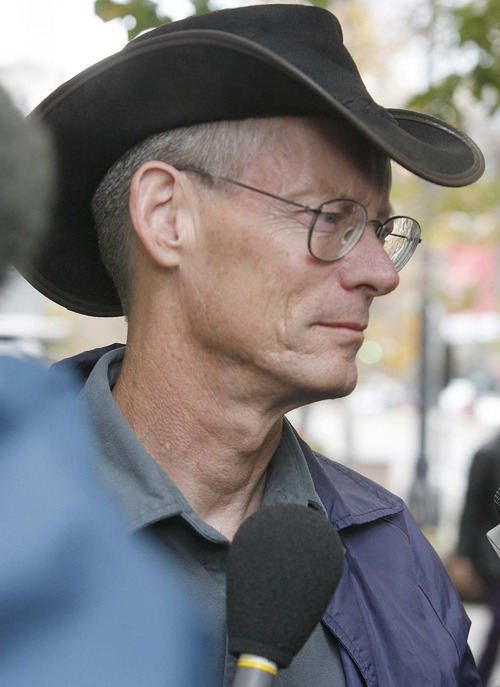This is an archived article that was published on sltrib.com in 2010, and information in the article may be outdated. It is provided only for personal research purposes and may not be reprinted.
While working with Brian David Mitchell at O.C. Tanner during the early 1990s, Doug Larsen came to consider his fellow tool-and-die cutter "close to being a brother."
"He and I hit it off really well. We had a lot of similar views about the world and religion," Larsen testified Tuesday for the defense at Mitchell's trial in the alleged kidnapping of Elizabeth Smart.
Several years later, Larsen spotted a transformed, biblical-looking Mitchell begging for money at Main and South Temple streets — a man who now refused to even acknowledge his former friend.
Larsen, hoping to find out what Mitchell had done throughout the years, said: "You gave that guy a 'God bless you' for 50 cents. Will you give me five minutes of your time for five dollars?"
Mitchell, money in hand, looked at him and said, "The Lord be praised. God bless you."
Larsen said, "I will pray for you," then started to walk away. Mitchell turned and, over his shoulder, said, "And I will pray for you."
Before that, Mitchell had been a clean-cut and "utterly sincere" member of the LDS Church, who was often ridiculed by other workers at the Salt Lake City jewelry company for singing hymns and zealously expressing his religious opinions. But after Mitchell quit in 1994 and became a follower of a naturopathic health concept called lymphology, Larsen said he lost track of him for four years prior to the Main Street encounter.
Prosecutors rested their case in chief Tuesday morning after four days of testimony that laid out the facts of Smart's alleged kidnapping and her nine months of captivity and sexual abuse at age 14 in the hands of Mitchell, 57, and his wife, Wanda Eileen Barzee, 65.
—
Defense makes its case • Now, with the start of the defense case, comes what U.S. District Judge Dale Kimball has identified as the real focus of the trial.
Larsen's testimony — and more to come this week from other defense witnesses who knew Mitchell prior to Smart's June 2002 disappearance — is designed to illustrate Mitchell's alleged descent into madness.
The defense is asking jurors to find Mitchell not guilty by reason of insanity. It also has the burden of proving he was insane at the time of the alleged crime.
To that end, Mitchell's father and other family members are slated to testify Wednesday about Mitchell's childhood and teenage years. Barzee, who pleaded guilty to kidnapping and unlawful transportation of a minor and is serving 15 years in prison, could take the witness stand as early as Thursday.
She is being held in the Davis County jail as she waits to give her testimony.
The defense's first witness Tuesday was Dru White, who was an LDS high councilor in 1987 when he met Mitchell and Barzee at a Salt Lake City ward. Mitchell was the bishop's clerk; Barzee the organist.
White said Mitchell was "quite clean-cut and well-dressed — a normal, conservative young man."
Mitchell had a reputation as "an active member of the ward and willing to work and serve," which earned him a promotion to counselor, White said.
"He seemed eager to do a good job," White said. "He was quiet but friendly. At meetings, he was quite attentive and listening carefully to everything that was going on."
On the witness stand, Larsen said he was devoted to his religion but that Mitchell was even more devoted.
They both read the same religious books, both assumed the prophesied Davidic king would arise from the upper leaders of the Mormon Church, and both admired then-LDS Church President Ezra Taft Benson as "among the great prophets."
He and Mitchell also considered most church members to be "largely idolatrous." He said they often discussed religion at work, and both were viewed by co-workers as "religious fanatic guys."
Mitchell got into arguments with co-workers about religion because he was "very confident to the point of being dogmatic and inflexible, and he came across as abrasive," Larsen said.
When co-workers became annoyed and called Mitchell "crazy," he would end the discussion by walking away, Larsen said.
But after Mitchell left O.C. Tanner, Larsen said the man he encountered wasn't the same man.
—
"Calculating" • Speaking to reporters outside court, Larsen said of Mitchell: "The person I knew no longer exists. He's completely changed."
"It's like Brian David Mitchell died," said Larsen, adding that he attributed the changes to Mitchell's experimentation with LSD as a teen.
But Larsen added that he didn't doubt Mitchell knew what he was doing.
"He's clever, he's lucid. He was calculating and in control," Larsen said, pointing out that Mitchell tried to keep from getting caught by police.
Larsen said that, while listening to testimony last week from Smart about what she called her "nine months of hell" with Mitchell and Barzee, he recalled that it was similar to a religious, science-fiction fantasy novel he once wrote and allowed Mitchell to read.
He testified that Mitchell objected to a portion of the novel in which a female character "prostitutes herself" to distract some guards and allow other family members to escape.
Mitchell claimed "he didn't think God would ask a girl to give up her virtue," Larsen said. Yet Smart had testified to a scenario "almost identical to his objections," Larsen said, referring to Mitchell's alleged contention that it was God's will that they "marry."
Larsen also related an anecdote about Mitchell from his time as an actor in a "creation" play, which used to be part of LDS temple ceremonies but has now been replaced by a movie.
Mitchell, who played the role of Satan, was taken aside and told, "You are one of the best Lucifers we've had, but could you tone it down a little?" Larsen said. "He was amused by their concern [that] he played a good devil and he was convincing."
—
More witnesses • Also Tuesday, the defense called two sons of the late C. Samuel West, a lymphologist who employed Mitchell to promote the concept that "bouncing" helps the blood and lymphatic system work together to prevent — and cure — disease.
Karl West testified that, when he first met Mitchell, he was clean-cut and dressed normally but later wore robes, earning him the nickname "The Israelite."
Mitchell and Barzee lived off and on in the basement of the Wests' Orem home — and also in a teepee in the backyard — while building a covered handcart, which they later pulled across the country, West said.
West testified that the couple left after having a religious disagreement with his father, possibly over the issue of practicing polygamy. West said the couple was also burning something in the basement of his home, which caused West to accuse them of "desecrating" the residence.
When Mitchell and Barzee reappeared in the spring or summer of 2001, West said they stood on the sidewalk in front of the home, yelling and "telling us the house was going to be destroyed."
"I'd never seen him like that," West told defense attorney Wendy Lewis. "He was off his rocker."
Asked if Mitchell appeared to be mentally ill, West said: "Yeah, in retrospect."
But when Prosecutor Felice Viti asked if Mitchell and Barzee may have burnt incense in the basement to cover the smell of marijuana, West agreed that, after seeing pictures of Mitchell on the news with a beer in his hand, he decided it was marijuana.
"Are you saying he fooled you?" Viti asked.
West replied: "Yeah, definitely."
Pamela Manson and Cimaron Neugebauer contributed to this report. —
More coverage of the Mitchell case online
O Follow the trial with live transcripts at sltrib.com. For past stories about the trial, visit sltrib.com/topics/mitchell. —
Defense wants sex count against Mitchell dismissed
Defense attorneys for Brian David Mitchell asked U.S. District Judge Dale Kimball on Tuesday to dismiss the charge of transporting a minor across state lines for the purpose of engaging in sexual activity.
The defense claims in court documents that the alleged sexual activity with Elizabeth Smart was "incidental to the primary purpose of the trip" from Utah to California in October 2002, which was to "find a warmer climate for the coming winter months."
Defense attorneys argued that Mitchell's other stated purpose for leaving Utah, according to Smart's testimony, was to acquire an additional wife or wives. That reason is also insufficient to support a conviction, the defense argued.
Prosecutors responded in court documents that sexual activity was "either a significant or dominant or motivating purpose" for the travel to California. They noted that, according to testimony from Smart, Mitchell intended to treat her as his "wife" in California and that he raped her within 24 hours of arriving there.
Mitchell also intended to obtain a new wife in California and that part of Smart's responsibility was to demonstrate sex for the new wife.
In addition to the sex-related charge, Mitchell is charged with kidnapping. Both counts carry potential sentences of life in prison.
Also Tuesday, the defense asked for a mistrialbecause prosecutors played a video recording of a police interrogation of Mitchell in which the officers mention prior allegations of sexual abuse of a child.
Prosecutors countered that the defense had agreed to admission of the video at trial.
Kimball denied the motion for a mistrial.


